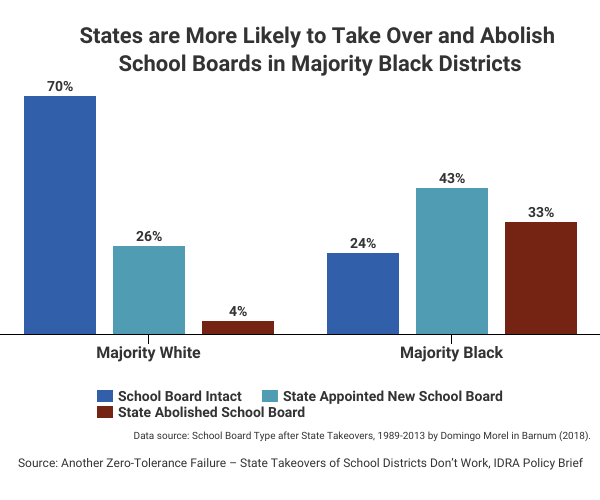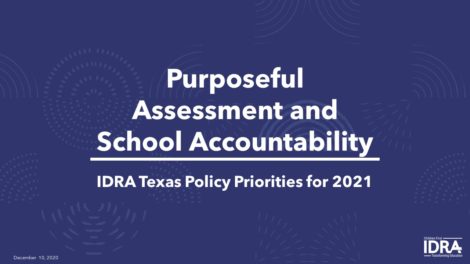The road to excellent and equitable public schools for Texas students has been long and fraught with obstacles. A history of relentless systemic discrimination and segregation, poor infrastructure, and a chronic lack of resources has shaped school systems and limited opportunities for generations of students.
All students and families deserve healthy school districts that serve all students equitably. Healthy school districts enjoy greater parent engagement, student success and staff satisfaction (Dryfoos & Maguire, 2019). Policies on school accountability, governance, quality and improvement should avoid a patchwork of private interventions in public schools and focus on districts’ local communities.
What makes a school district healthy?
A healthy school district centers educational equity, community engagement and the success of students in all aspects of their education. A healthy school district has a democratically elected, well-functioning, representative school board and administrators who prioritize racial and socioeconomic equity and integration in their school assignment and boundary decisions. And they receive state support to enhance district performance without fear of state takeover.
What makes a school district unhealthy?
Below are some policies that affect school district health in Texas.
Testing that Harms Students: Since the 1990s, Texas has relied on standardized tests to assess students’ academic achievement and the “health” of schools and districts. Research shows this form of testing is a poor measure of student, school and district health when used as the sole or primary indicator. When states attach high-stakes consequences to test results, it creates stressful classroom environments that harm learning and contribute to teacher burnout and turnover.
A-F Accountability: The Texas Education Agency uses letter grades to rate school districts and campuses. These grades are based on overly-simplified accountability measures that rely too heavily on standardized tests and ignore much of the work schools do to ensure students’ academic and social progress.
Senate Bill 1882: This 2017 legislation permits districts to partner with external operating entities, including charter school organizations, institutions of higher education and non-profits to turn around or “improve” one or more schools. Unfortunately, this bill compromises district health by incentivizing schools to partner with privately-managed charter organizations, which can then control school governance, hiring and operations. This challenges public school transparency and over-emphasizes a single campus instead of whole-district improvement. (Note: The Texas Education Agency announced on December 10, 2020, that A-F ratings would be paused for 2020-21 school year.


Segregation: Texas has some of the most deeply segregated school districts based on race and socioeconomic class in the country (EdBuild, 2019). Students who attend diverse, integrated schools have better academic, social and life outcomes. Punitive accountability systems, standardized tests, privatized school choice and state takeovers are all shown to exacerbate school segregation.
Policy Recommendations for Texas
The Texas Legislature should…
- Prioritize ways to support struggling districts before or instead of implementing state takeover procedures, including focusing on campus-level assessments, allowing for supportive models (such as full-service community schools) and developing community-based options for governance and accountability systems.
- Suspend the normal administration of STAAR for 2020-21, allow interim assessments to be used as formative assessments for diagnostic purposes to determine how students are learning.
- Halt high-stakes consequences for students associated with STAAR test performance, such as grade promotion and high school graduation. School accountability must not harm students now or ever.
- Reduce the number of state end-of-course exams in Texas by eliminating that English II and U.S. History exams that are not required by federal law (ESSA).
Legislators and state education officials should…
- Develop alternatives to our current state test assessments. Meaningful assessment systems allow more holistic assessment of students’ knowledge and skills. This could include tests that enable students to demonstrate bilingualism and biliteracy and portfolio-based assessment.
Districts should…
- Implement the IDRA Quality Schools Action Framework that brings together parents, schools, administrators and students, along with regular and robust equity audits and wraparound services to embed equitable education and family engagement in district activities.


Purposeful Assessment and School Accountability – IDRA Texas Policy Priorities for 2021
Evaluación intencionada y responsabilidad escolar – Prioridades de política de IDRA Texas para 2021
For more information, contact Dr. Chloe Latham Sikes, IDRA Deputy Director of Policy (chloe.sikes@idra.org) or Ana Ramón, IDRA Deputy Director of Advocacy (ana.ramon@idra.org).
References
Dryfoos, J., & Maguire, S. (2019). Inside Full-Service Community Schools. Corwin.
EdBuild. (2019). Dismissed: America’s Most Divisive Borders. Jersey City, N.J.: EdBuild.
Latham Sikes, C. (May 2020). Implications of Texas SB 1882 Patchwork of Partnerships. IDRA Newsletter.
Morel, D. (2018). Takeover: Race, education, and American democracy. Oxford University Press.
Robledo Montecel, M., & Goodman, C. (2010). Courage to Connect: A Quality Schools Action Framework. San Antonio, Texas: IDRA.
Wilson, T., & Latham Sikes, C. (2020). Another Zero-Tolerance Failure – State Takeovers of School Districts Don’t Work. San Antonio Texas: IDRA.
Wong, K.K. & Shen, F.X. (2005). When Mayors Lead Urban Schools: Assessing the Effects of Takeover. In W.G. Howell (Ed.), Besieged: School Boards and the Future of Education Politics. Washington, D.C.: Brookings Institution Press.

